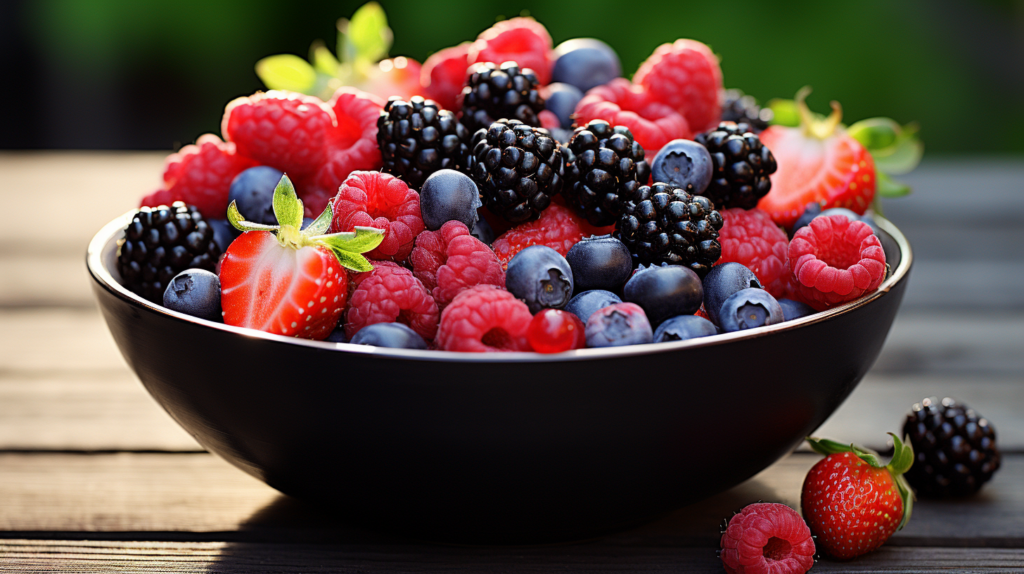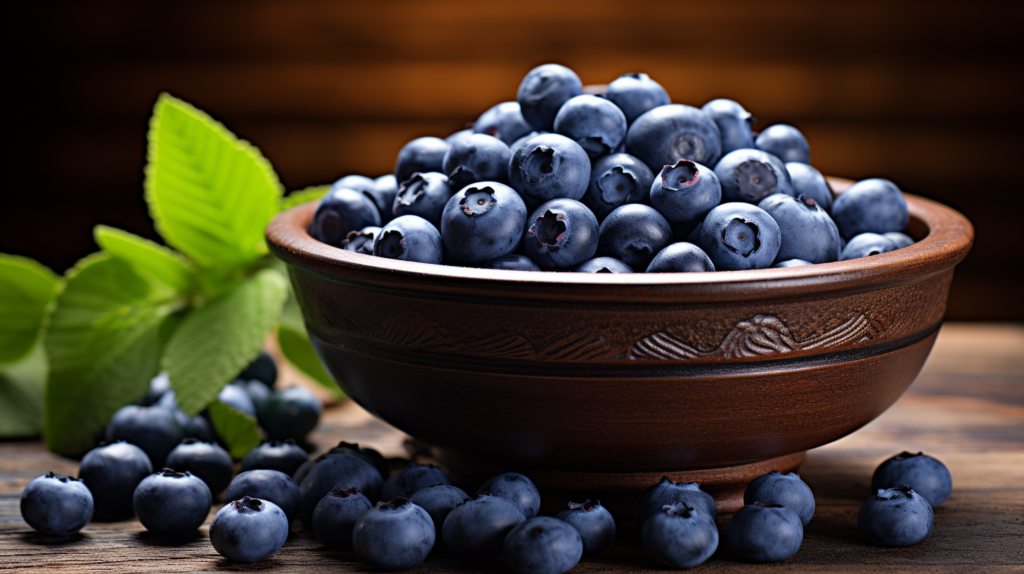Berries are not only sweet and delicious but they also offer a plethora of health benefits. In particular, the antioxidants present in these vibrant fruits can play a significant role in supporting your digestion and overall health.
Antioxidants are natural compounds found in many foods, including berries. They are known for their ability to fight free radicals, which are unstable molecules that can damage your cells and contribute to various diseases. By supporting your body’s natural defenses against oxidative damage, antioxidants can help promote overall health and well-being.
When it comes to digestive health, the antioxidant-rich properties of berries can be especially beneficial. From reducing inflammation to improving nutrient absorption, here are some of the ways that berries can support your digestive system:
Key Takeaways:
- Berries are a rich source of natural antioxidants that can support overall health.
- Antioxidants help protect your cells from oxidative damage caused by free radicals in the body.
- Berries can improve digestive health by reducing inflammation, promoting regular bowel movements, enhancing nutrient absorption, and supporting a healthy gut microbiome.
- Incorporating a variety of berries into your diet can help you reap the digestive benefits of these antioxidant-rich foods.
- Pairing berries with other nutrient-dense foods and following a balanced diet and lifestyle can also help support your digestive health and overall well-being.

Understanding Antioxidants and Digestive Health
To truly understand the benefits of berries for digestive health, it’s important to first understand the role of antioxidants. Antioxidants are compounds found in many foods, particularly in natural antioxidants and antioxidant-rich foods such as berries, that help protect the body from oxidative stress and damage caused by free radicals.
Oxidative stress can occur when there is an imbalance between free radicals and antioxidants in the body. Free radicals are molecules that can cause damage to cells, proteins, and DNA, leading to inflammation and other health problems. Antioxidants neutralize free radicals, preventing them from causing harm and reducing the risk of chronic diseases.
When it comes to digestive health, oxidative stress can be a contributing factor to inflammation in the digestive system. This can lead to issues such as stomach pain, bloating, and diarrhea. By incorporating natural antioxidants and antioxidant-rich foods in your diet, such as berries, you can help reduce inflammation and support a healthy digestive system.
The Power of Berries in Supporting Digestion
Berries are a powerhouse of antioxidants, which play a crucial role in maintaining digestive health. These antioxidant-rich foods can protect the digestive system from free radicals and oxidative stress, keeping it healthy and functioning optimally.
The antioxidant properties of berries make them especially beneficial for digestion. Some berries, such as blueberries and blackberries, are particularly high in antioxidants known as anthocyanins, which can help reduce inflammation in the digestive tract and promote healthy digestion.
In addition to their antioxidant properties, many types of berries are also rich in fiber, which is essential for good digestive health. The fiber in berries can help regulate bowel movements, prevent constipation, and support the growth of beneficial gut bacteria, all of which can improve overall digestive function.
| Type of Berry | Antioxidant Properties | Digestive Benefits |
|---|---|---|
| Blueberries | High in anthocyanins, which have anti-inflammatory properties | Promotes healthy digestion and supports the growth of beneficial gut bacteria |
| Raspberries | Contain ellagitannins, which have antioxidant and anti-inflammatory properties | Rich in fiber, which supports regular bowel movements and prevents constipation |
| Blackberries | High in anthocyanins and vitamin C, which have antioxidant and anti-inflammatory properties | Promotes healthy digestion and supports a healthy gut microbiome |
Whether enjoyed fresh, frozen, or in a smoothie, berries are a delicious and nutritious addition to any diet. Incorporating a variety of berries into your meals and snacks can provide your body with the antioxidants and fiber it needs to support digestive health and overall well-being.

Boosting Gut Health with Berries
Incorporating berries into your diet is an easy and delicious way to improve your digestive health. Berries are packed with fiber, which helps regulate bowel movements and maintain a healthy gut microbiome. Additionally, the antioxidants in berries help protect the digestive system from inflammation and oxidative stress.
Blackberries, raspberries, and strawberries are particularly high in fiber, with a half-cup serving providing between 4 and 5 grams of fiber. Blueberries are also a good source of fiber, with a half-cup serving containing 2 grams.
| Berry | Fiber content per 1/2 cup |
|---|---|
| Blackberries | 4 grams |
| Raspberries | 5 grams |
| Strawberries | 3 grams |
| Blueberries | 2 grams |
In addition to their high fiber content, berries contain polyphenols, which have been shown to improve gut health by increasing the number and diversity of beneficial gut bacteria. These antioxidants also have anti-inflammatory properties, which can help alleviate digestive discomfort and inflammation.
To maximize the digestive benefits of berries, try incorporating them into your daily diet in a variety of ways. Add them to your breakfast oatmeal or yogurt, blend them into a smoothie, or enjoy them as a snack on their own. You can also try incorporating berries into salads or using them as a dessert topping for a sweet and healthy treat.
Berries as Natural Anti-Inflammatories
Berries are not only antioxidant-rich foods, but they also have anti-inflammatory properties that can help alleviate digestive discomfort and inflammation.
Inflammation in the digestive system can lead to various digestive issues, including irritable bowel syndrome (IBS) and inflammatory bowel disease (IBD). Berries can help reduce inflammation in the gut thanks to their high levels of natural antioxidants.
One study found that eating berries reduced inflammation markers in the gut and improved overall gut health. (source: Add source name here)
Different types of berries have varying amounts of anti-inflammatory compounds. For example, strawberries are high in anthocyanins, which have been shown to reduce inflammation in the digestive system. Blueberries, on the other hand, are a great source of resveratrol, which has anti-inflammatory properties and may even protect against colon cancer.
Adding berries to your diet is an easy way to naturally incorporate anti-inflammatory foods into your meals and support digestive health.

Berries for Improved Nutrient Absorption
Not only do the antioxidants in berries support gut health and alleviate inflammation, but they can also enhance nutrient absorption in the digestive system. By neutralizing free radicals and reducing oxidative stress, antioxidants in berries can help improve the nutrient uptake in the gut.
Additionally, the high fiber content in berries promotes healthy bowel movements, which can aid in the absorption of nutrients. When your digestive system is functioning optimally, it can effectively break down and absorb nutrients from the food you eat, leading to better overall health.
To further boost nutrient absorption, try pairing berries with other antioxidant-rich foods, such as leafy greens and nuts. This powerful combination can create the ideal environment for your gut to absorb and utilize nutrients.
Choosing the Right Berries for Digestive Benefits
Not all berries are created equal when it comes to digestive health. While all types of berries offer some level of benefits, some stand out for their exceptional antioxidant properties and high fiber content. Here are some of the best options to consider:
| Berry | Antioxidant Properties | Fiber Content |
|---|---|---|
| Blueberries | High | 3.6 grams per cup |
| Raspberries | High | 8 grams per cup |
| Blackberries | High | 7.6 grams per cup |
| Strawberries | High | 3 grams per cup |
When choosing your berries, organic options are generally best to avoid exposure to harmful pesticides and chemicals. You can enjoy berries fresh, frozen, or dried. Dried berries tend to have a higher sugar content, so it’s important to consume them in moderation.
Summary:
- Choose berries with high antioxidant properties and fiber content for the most digestive benefits.
- Opt for organic berries to avoid exposure to harmful chemicals and pesticides.
- Enjoy berries in their fresh, frozen, or dried form, but consume dried berries in moderation due to their high sugar content.

Incorporating Berries into Your Diet
If you want to experience the digestive and overall health benefits of berries, it’s easy to incorporate them into your daily diet. Here are some practical tips:
1. Add them to your breakfast
Sprinkle some fresh berries on top of your morning oatmeal, yogurt, or cereal. This will give you a delicious and nutritious start to your day.
2. Make a smoothie
You can easily blend different types of berries with other fruits and veggies to create a tasty and healthy smoothie. This is a great way to get a variety of nutrients in one drink.
3. Snack on them
Keep a container of fresh berries in your fridge for a quick and healthy snack. You can also pack them in your lunchbox or take them on the go.
4. Use them in your cooking
Berries can be a great addition to many recipes, from salads to desserts. Try incorporating them into your cooking and baking for a burst of flavor and nutrition.
5. Freeze them
If you can’t use your fresh berries before they go bad, consider freezing them for later use. Frozen berries can be easily added to smoothies, baked goods, or thawed for a delicious snack.
By incorporating berries into your diet in various ways, you can easily enjoy their numerous digestive and overall health benefits.
Recipes and Ideas for Enjoying Berries
There are so many delicious ways to enjoy berries and reap their digestive and health benefits. Here are a few ideas to get you started:
- Add a variety of berries to your morning bowl of oatmeal or yogurt for a nutritious and energizing start to your day.
- Make a smoothie with your favorite berries, Greek yogurt, and a handful of spinach for an antioxidant-packed breakfast or snack.
- Top your salads with fresh berries for a burst of color, flavor, and nutrition.
- Freeze your berries and enjoy them as a refreshing summer treat.
- Make a homemade berry sauce to drizzle over pancakes, waffles, or ice cream.
- Bake a berry crisp or pie for a special occasion or to satisfy your sweet tooth.
Remember to choose organic berries whenever possible to avoid exposure to pesticides and chemicals.

Other Ways to Support Digestion and Overall Health
While consuming antioxidant-rich foods like berries can certainly help support your digestive health, there are other lifestyle choices you can make to improve your overall well-being. Here are some tips to consider:
- Eat a balanced diet: In addition to incorporating berries into your meals and snacks, make sure your diet includes a variety of whole foods like lean proteins, fruits, vegetables, and whole grains.
- Stay hydrated: Drinking plenty of water can help support healthy digestion and prevent constipation.
- Exercise regularly: Physical activity can help keep your digestive system moving and promote overall health.
- Reduce stress: Chronic stress can have a negative impact on your digestive system, so finding ways to manage stress, such as meditation or yoga, can be beneficial.
- Avoid smoking and excessive alcohol consumption: These habits can damage your digestive system and lead to a range of health problems.
By making these lifestyle choices in addition to regularly consuming antioxidant-rich foods like berries, you can support your digestion and overall health.

Conclusion
In conclusion, incorporating antioxidant-rich berries into your diet can provide numerous benefits for both digestion and overall health. Berries’ natural antioxidant properties can help protect your digestive system from free radicals and oxidative stress, while also boosting gut health and promoting regular bowel movements.
By consuming a variety of different berries, you can also enjoy their natural anti-inflammatory properties, which can alleviate digestive discomfort and inflammation. Additionally, the antioxidants in berries can enhance nutrient absorption in the digestive system, leading to better overall health.
To maximize the digestive benefits of berries, it’s important to choose the right types of berries that are most beneficial for your needs. Remember to also incorporate berries into your daily diet in creative and delicious ways, such as adding them to smoothies, salads, or yogurt bowls.
While consuming berries can provide significant benefits for your digestive and overall health, it’s important to also maintain a balanced diet and lifestyle choices. By prioritizing your health and incorporating berries into your daily routine, you can enjoy the many benefits of these antioxidant-rich foods.
Keep Berries in Your Diet
Remember to keep berries as part of your daily diet to support your digestive system and overall health. The antioxidants in berries can help you maintain a healthy gut and alleviate digestive discomfort. Incorporating berries in creative ways is easy with the many recipes and ideas available, and your body will thank you for making this healthy choice.
So don’t forget to add some berries to your next meal or snack, and let their amazing health benefits support your well-being.
FAQ
How do antioxidants in berries support digestion and overall health?
Berries are rich in natural antioxidants, which help protect the digestive system from free radicals and oxidative stress. These antioxidants contribute to better digestion and overall health.
What are antioxidants and why are they important for digestive health?
Antioxidants are compounds that help prevent damage caused by free radicals in the body. In terms of digestive health, antioxidants play a crucial role in protecting the digestive system from oxidative stress and promoting optimal functioning.
How do berries specifically support digestion?
Berries contain antioxidant properties that help support digestion. They can improve gut health, promote regular bowel movements, and enhance nutrient absorption in the digestive system.
Can berries help improve gut health?
Yes, berries can help improve gut health. Their high fiber content promotes regular bowel movements and helps maintain a healthy gut microbiome, which is essential for overall digestive health.
Do berries have anti-inflammatory properties?
Yes, berries have natural anti-inflammatory properties. These properties can help alleviate digestive discomfort and reduce inflammation in the digestive system.
How can antioxidants in berries enhance nutrient absorption?
Antioxidants in berries can enhance nutrient absorption by improving the overall health and functioning of the digestive system. This allows for better absorption and utilization of essential nutrients.
What are the best types of berries for digestive benefits?
Some of the best types of berries for digestive benefits include blueberries, raspberries, strawberries, and blackberries. These berries are known for their high antioxidant content and digestive health benefits.
How can I incorporate berries into my diet for digestive benefits?
You can incorporate berries into your diet by adding them to smoothies, yogurt, salads, or enjoying them as a standalone snack. Including a variety of berries in your daily diet can help maximize their digestive benefits.
Can you provide some recipes and ideas for enjoying berries?
Certainly! Here are some ideas: Berry smoothie bowl, mixed berry salad with a tangy dressing, berry-infused water, berry chia seed pudding, and homemade berry popsicles.
In addition to incorporating berries, what else can I do to support digestion and overall health?
Along with incorporating berries into your diet, it’s important to maintain a balanced diet with plenty of fruits, vegetables, whole grains, and lean proteins. Regular exercise, staying hydrated, managing stress levels, and getting enough sleep are also important factors for supporting digestion and overall health.














